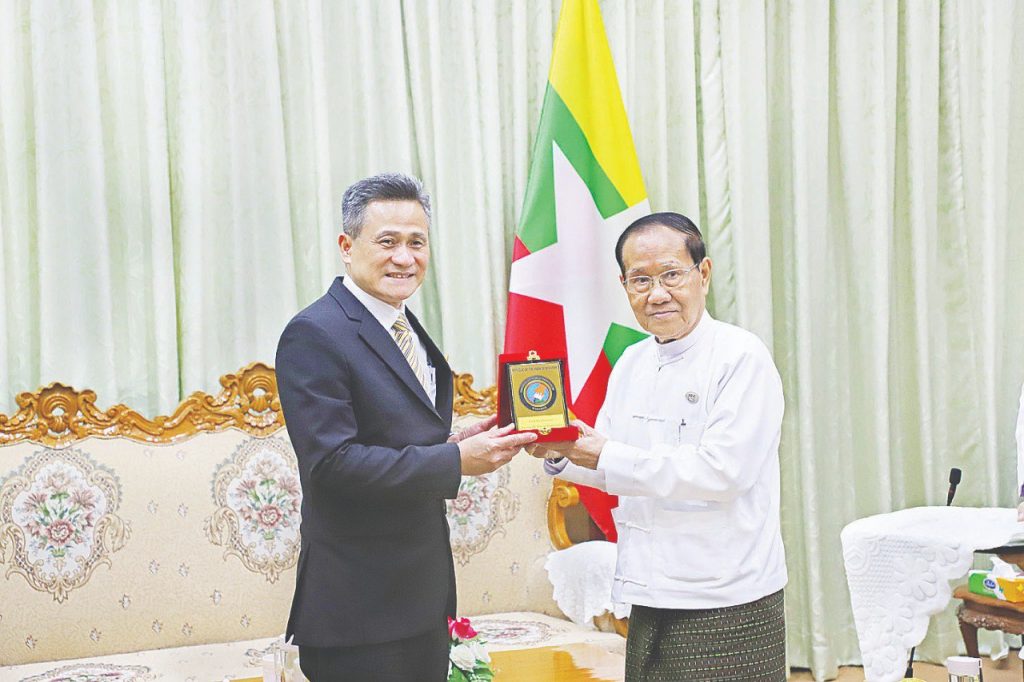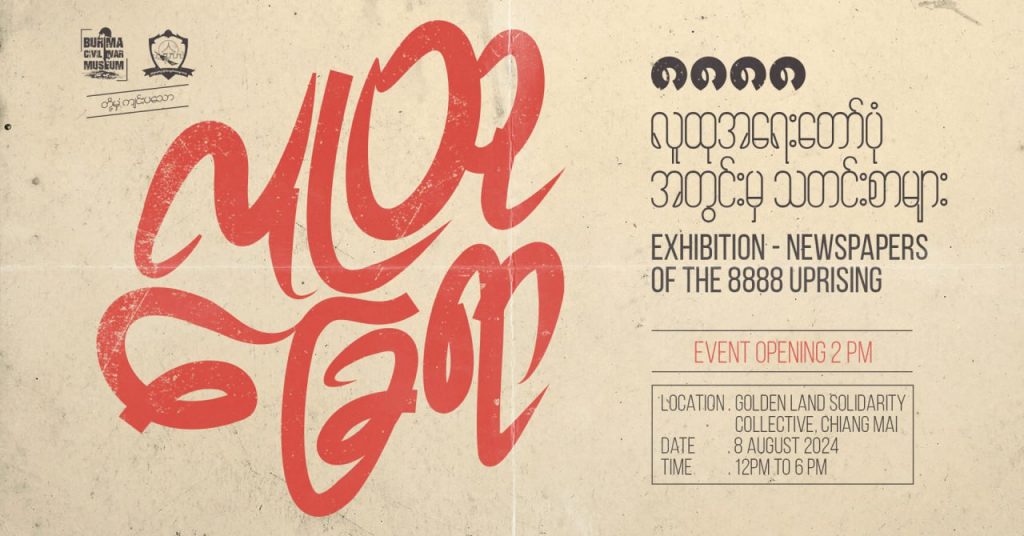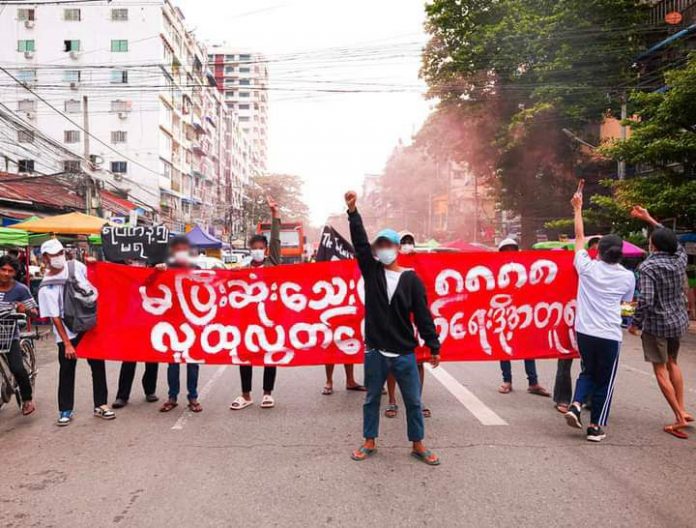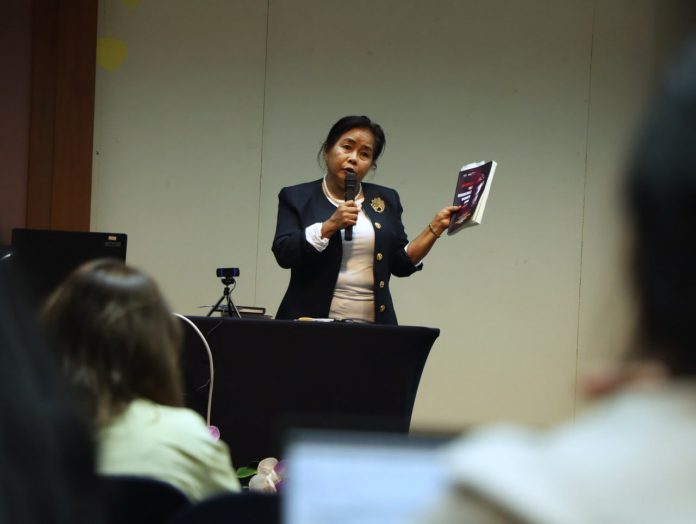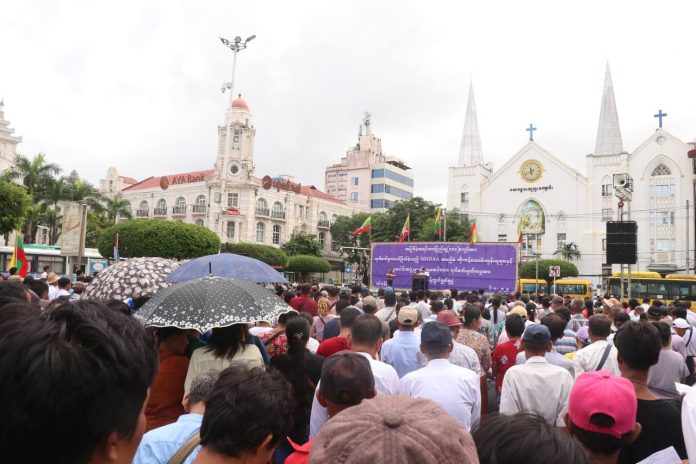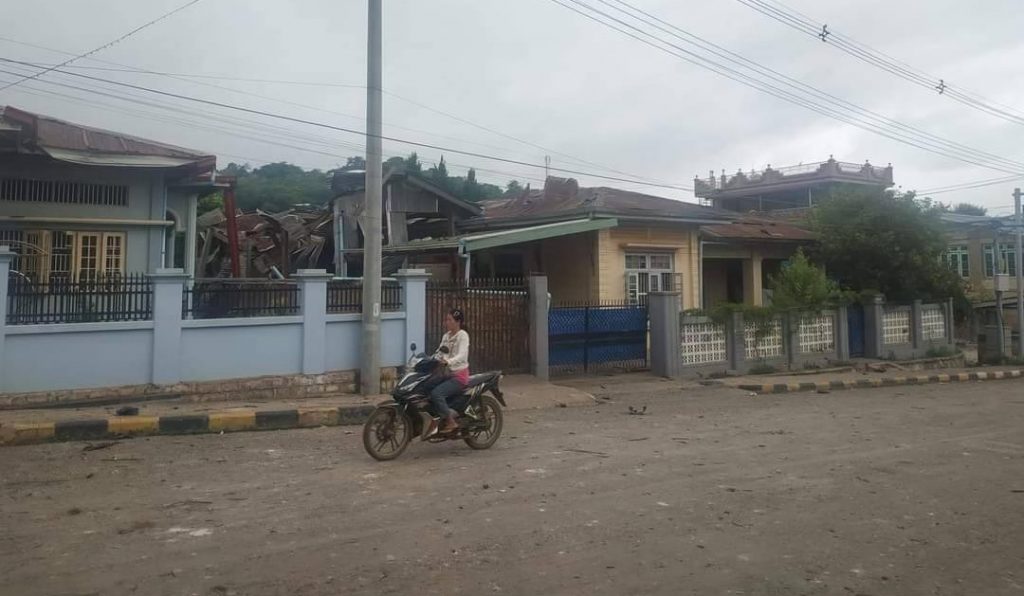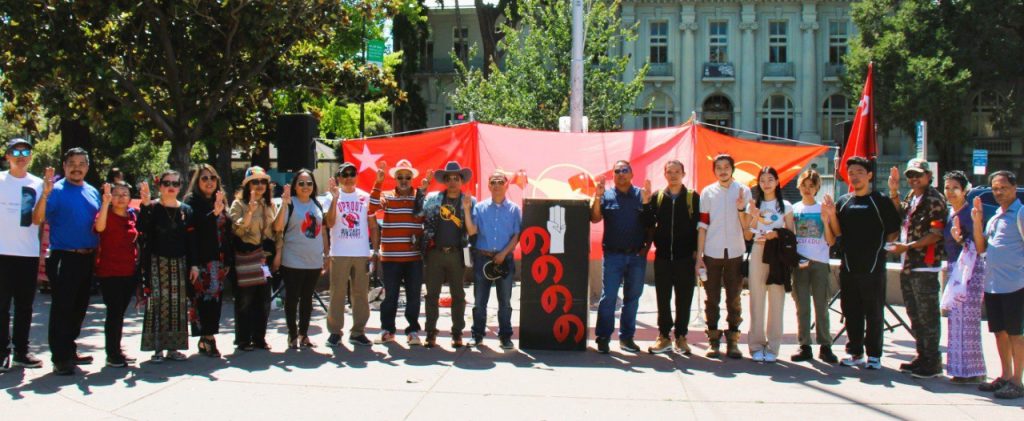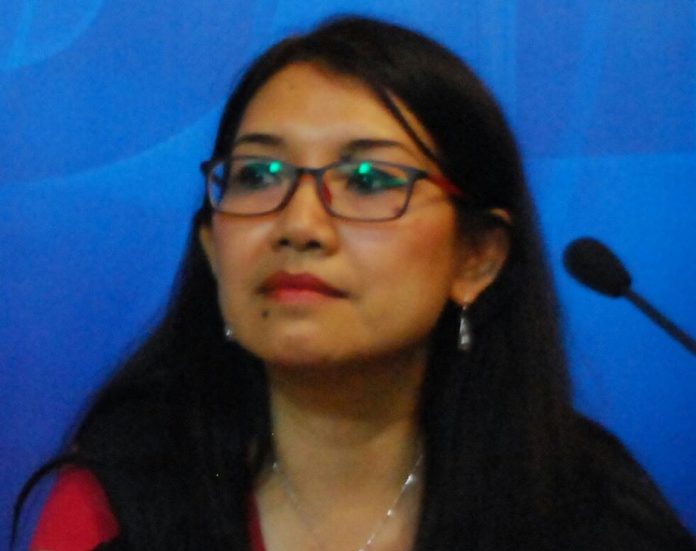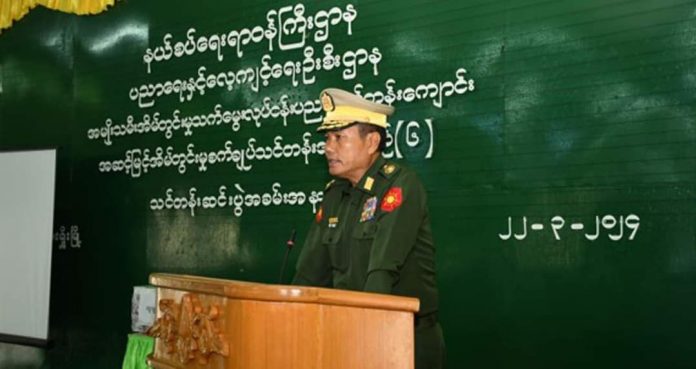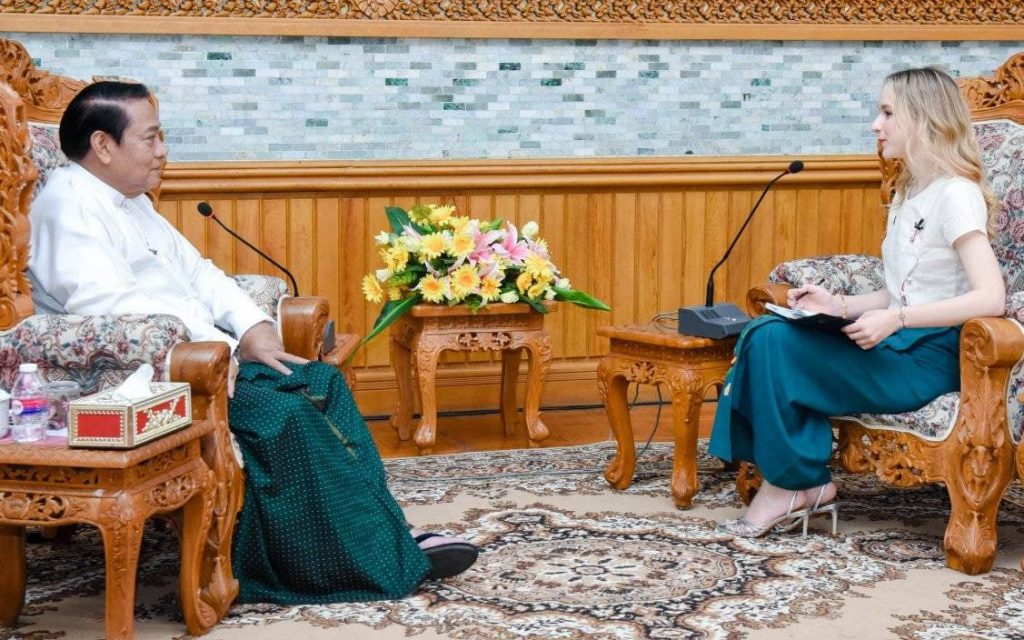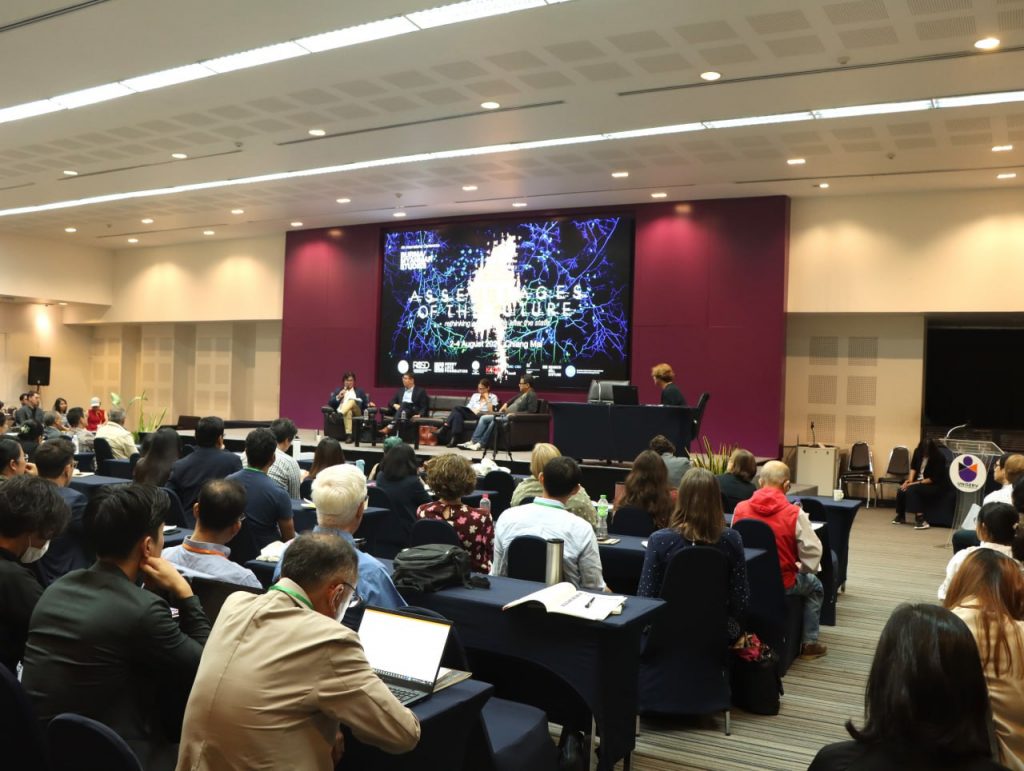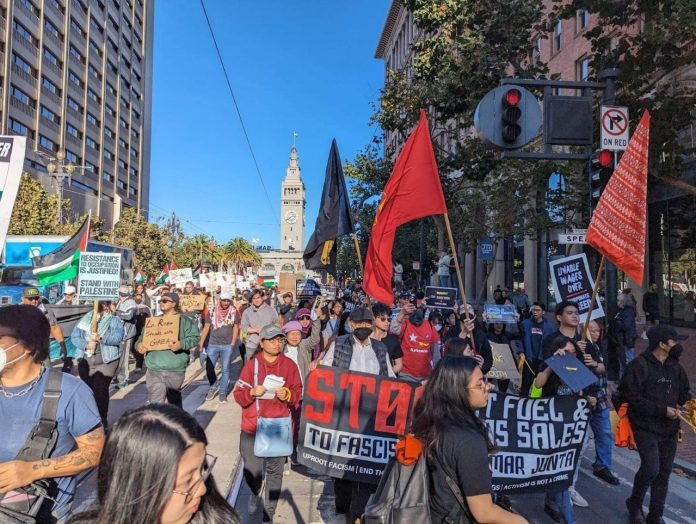Guest contributor
Khin Ohmar
How chaos can lead to disaster
A ‘leaderless’ movement of leaders
The Spring Revolution has declared itself a leaderless movement. When a leaderless movement is based on a power analysis challenging hierarchy and control, it can open space for greater representation, particularly of traditionally marginalized groups. But at this critical point of shifting power, the movement needs to ask ourselves: don’t we need shared and coordinated leadership?
With so many groups and so many actors, especially those with military power, a leaderless movement can in essence mean leaders in different groups that lack strategic coordination and collaboration – or shared leadership. Shared-leadership can increase the momentum and leverage for the movement to achieve the goal, while a movement lacking strategic coordinated leadership can go nowhere or regress.
Militaries stay in control instead of handing over power to civilians
Since 1988, the people of Myanmar have risen up against military rule. The social transformation that underpins the Spring Revolution cannot be realized under military control. With the cruelty and terror by the Myanmar military, the armed revolution is inevitable – not only to defend and protect but to liberate from military tyranny. But, the danger of an armed revolution is when the armed revolutionary leaders see armed struggle as the primary means to achieve the political objectives while undermining or under-appreciating other means, such as non-violence or political defiance. They may dismiss or ignore the critical role of civil society as a check and balance to their power for public transparency and accountability. There is then a risk of continuation of military dictatorship or authoritarian rule in different forms and to different degrees, rather than a transformed society embracing democratic values and norms.
It is essential that armed revolutionary leaders keep sight of their goal to achieve people’s aspiration to dismantle the central military system, and keep people – civilians – at the center of the governance. It is critical for a people’s movement with the objective to dismantle any dictatorship – as the Spring Revolution youth have claimed for the past three years – that armed revolutionary groups do not assume the role of governing bodies, but instead support the set-up and safeguarding of civilian governing bodies. This is the minimal but critical and essential shift towards achieving the social transformation we envision. We cannot rid ourselves of the Myanmar military just to form other military states.
That is the democracy part of a Federal Democracy. Civil society is absolutely essential in contributing to the set-up of the governance, administrations, and social service provisions for the population while continuing their role of checks and balances to the political bodies, armed resistance forces and institutions, once the Myanmar military is no longer in control.
A need to strengthen practice of democracy/institutionalization
One of the shortcomings of a leaderless movement can be the absence of democratic systems in practice in the name of building democracy from the bottom up. As the Spring Revolution has reached over 3.5 years, the movement could only become stronger if revolutionary forces – both armed and non-armed – would develop the frameworks or institutions needed for the practice of democracy. Democratic foundations – constitutions, elections and representation, codes of conduct, principles of accountability – are needed to maintain forward movement in an effective way.
While the Spring Revolution has been based on ideals of ‘bottom-up’ democracy, the process of how to be effective in functional decision-making and representation from the bottom-up still seems unclear. People want leaderless movements because they don’t want to be under a leadership structure and follow decisions made on their behalf without their say or participation. But without that formal structure, it is essential they come to agree on how to make decisions in a democratic process based on inclusion and power sharing. The current movement needs to develop and agree upon clear and proper structures and procedures for ensuring inclusive representation and democratic decision making. That would strengthen the movement’s ability to act on the vision of collective leadership.
A need for genuine women’s and LGBTQIA+ representation
In the actual revolution on the ground and in real politics, where are the women’s roles? While there is recognition of women’s role – in some organizations or entities, for example, young women have become a part of the top leadership – but real power in how decisions are made or how much meaningful space and participation they have still need to be assessed. And of course, the worst case is that women are used as tokens of representation with no power. Genuine inclusion and representation requires equal decision-making power, which still remains elusive for women leaders.
Similarly, while LGBTQIA+ visibility and representation was notable in the early days and months of protests of the Spring Revolution, now three and a half years on, LGBTQIA+ people’s participation and issues have become less visible. Despite increased acceptance of their rights and their contributions in the revolution, LGBTQIA+ activists still face myriad challenges in all spheres of life, including social stigma, discrimination, harassment and violence.
Complicity in injustice in the name of revolution
One of the biggest barriers to genuine democracy building is people staying silent about injustice in the name of ‘progress’, in the name of benefitting the revolution. In an environment of silence in the face of oppression, when people do raise their voices, speak up, speak out against injustice, they are condemned as destroying or delaying the revolution. But by staying silent or trying to silence those voices, the revolution loses its credibility by contradicting its own purpose.
That silencing of dissent is exactly what happened in 2017, which allowed the fueling of the Rohingya genocide. Those of us who spoke out against the egregious violence were told we were disturbing the transition to democracy. We were labeled peace spoilers by friends and called national traitors and enemies of the state by opponents.
Now the context has shifted, but the results will be the same. Speaking out about and against injustice and oppression we are witnessing within the revolutionary organizations now can get one labeled a revolution spoiler. This includes the violence and violations against the Rohingya, sexual and gender-based violence within the revolution, as well as continued discrimination and exclusion of marginalized groups including LGBTQIA+ and people with disabilities. What kind of society are we trying to build when speaking out against injustice is seen to spoil the revolution that claims to end the injustices?
If we are going to build a society in a federal democracy, with the principles of equality and inclusivity, equity, justice, accountability – as the revolution has claimed – how can we actually see it when the Rohingya community, survivors of the Myanmar military’s genocide, is still being targeted and we remain silent? When women and LGBTQIA+ are still not safe and respected as leaders in our movement? When we don’t maintain a commitment to full and meaningful inclusion? The revolution must maintain its dignity by fulfilling its obligation and commitment to the principle of human rights protection for social transformation.
International community focus on stability
One of the many failings during the 10 years of international community re-engagement with Myanmar (2011-2020) was support for the military’s plan to ‘share power’. It was never an equal-power playing field between the military on one side and those parties in opposition to the military on the other side – be they political parties or ethnic armed resistance groups. International donor money enabled the military to further clamp down and suppress minority and opposition groups, through investments or money or nominal political power, to keep them silent. This enabled the state’s sovereign central system of oppression, militarization, discrimination and persecution – built, dominated and entrenched by the military – to continue to run.
Stability is perceived to be achieved or functioning when a state central system continues to be run by the majority, and in the case of Myanmar, that central system is military control. The international community supported the military “sharing” this control or power over the Myanmar state with the National League for Democracy (NLD) under Daw Aung San Suu Kyi after 2015, as the stability of Myanmar. With both the military and the NLD dominated by the Bamar majority, this “stability” became an extension of state control by the Bamar, further perpetuating the Burmanization of non-Bamar minority ethnic nationalities. Stability should mean stable lives and livelihoods with human security and dignity of the population. This is particularly urgent for the minority ethnic nationalities whose rights and access to equal power-sharing or self-determination has been denied, deprived, marginalized, and disenfranchised for generations. Yet, a human-centered focus which addresses root causes of injustice seems completely missing in the international version of stability.
When the ruling class of any state or nation is the majority, they need to and want to have the central system run functioning effectively under their control, so they continue to remain in or hold on to power. And they will do all they can to diminish any resistance of minorities by different means – coercion, repression, annihilation. But it can also be done by giving incentives in the name of ‘power sharing’ to those with the strongest opposition to their power.
This power sharing is labelled as ‘peace’ in conventional thinking. If you can convince everyone that they have a share of the power, then you can achieve a ceasefire; cease the conflict and that constitutes peace. Stability becomes the immediate next step. What those in power see as stability in essence means no resistance, giving up – such as disarmament, demobilization and reintegration (DDR) of former combatants of the resistance movements – a one-sided process for the less powerful actors to surrender and enter the “legal fold” under the central system controlled by the majority. Rather than everyone comes to a ‘middle ground’ for systemic rebuilding and reform. ‘Stability’ where resistance to the oppressive state is suppressed primarily benefits the powerful majority; they can continue to govern under state sovereignty while the minorities are brought under the central system for further institutionalized oppression and discrimination.
This form of ‘stability’ in essence crushes resistance, with the nuance of negotiations, a negotiated settlement towards peace. They call it ‘dialogue’: ‘Let’s have the resistance engage in dialogue with the ruling class; bring the resistance to the table, have them discuss, and have them negotiate, and have some sort of power sharing under the terms of or agreed by the ruling class’. But this scenario completely lacks a power analysis. While the resistance groups generally have the power of community support and territorial control with governance and administation, the military has the leverage of the state structure which comes with the financial, political, and even military weight of the international community, including the U.N. and ASEAN, in the name of state sovereignty. Even though a settlement is called power sharing, the reality is the ruling class has the power to offer something to essentially co-opt the smaller ones.
To the international community, the perception of stability in Myanmar appears to be mostly dependent on maintaining the status quo of a centralized Myanmar state as part of their systems, such as in the U.N. and ASEAN. This must change. The different communities in Myanmar are building horizontal movements and nations, and their coming together will be determined by their shared vision and agreement. This must be supported..
Different ethnic groups, with their historical pasts of their own nations and ancestral land and needs to address for the future coming together, have established their own administrations, and in many cases are strengthening administrations that existed long before 2021. And their realities on the ground are not tied to this Myanmar map or Myanmar state sovereignty. They are able to self-govern with their natural resources to manage for generations to come.
The current realities of Myanmar call on the international community as well as the majority in Myanmar to recognize the past independence and present needs of the minority ethnic nationalities and come to terms with acceptance, respect and recognition of an equal partnership for the new coming together.
How do we choose the path of opportunity from the current chaos instead of heading towards potential disaster?
Is the current moment chaotic? Yes. But that chaos is something that should be taken as an opportunity rather than a threat if people can come together in effective collaboration for the outcome they want to achieve. And that’s what we the people of Myanmar should do and the international community should support. Horizontal people’s movements have emerged in the different regions, different areas, building the nation-state together. This is a huge positive outcome, as it means the central military system from Naypyidaw, which used to be the barrier between communities, has now weakened if not entirely broken down, as it has in many areas already. The chaos created from the Spring Revolution’s efforts to dismantle the central system has come to be in effect, allows the people to be able to reach out to one another without a wall between them. Inversely, this can also lead to conflict since the walls between them have collapsed.
If we suppress the chaos of the moment in a forced attempt to achieve state stability, we miss the opportunity to find a solution for the long-term stability, or sustainable solution of the people coming together. That requires a commitment by both local actors and the international community to achieve this coming together with a new vision. All actors must prioritize the protection of human rights of all communities at all times and in all circumstances. That cannot be compromised.
Armed resistance groups must create democratic space to establish civilian governances and protect the rights of civilians. They must recognize and respect the role and space for civil society. The revolution cannot succeed unless the armed resistance views civil society as integral to nation-building, ensuring accountability and establishing checks and balances. Civil society must maintain its independent role and keep both political and armed resistance groups transparent and accountable to the public, and keep the revolution committed to the principles of human rights, inclusion, and civilian protection.
Civil society also needs to practice bottom-up democracy now, in our organizations, networks and alliances. We don’t need to wait – we should not and cannot wait – until Naypyidaw falls in order to put our visions of bottom-up democracy into practice.
Now there is the possibility to define all of the peoples’ futures as communities in peaceful coexistence together. And we can learn from each other. If one area is able to build people’s participatory democratic governance structures and institutions, such as in the case of Karenni State Interim Executive Council – other areas can learn and follow.
The role of the international community
The international community must learn from the 10 years of re-engagement when they supported the one-sided military’s ‘peace’ agenda and allowed the process to fall short of principles of democracy and human rights values.
The international community needs to commit to processes that ensure and prioritize the stability of peoples’ lives and livelihoods and human security on the ground, not the false and oppressive stability of the state’s centralized control. The international community must embrace the chaos of the current landscape as an opportunity for sustainable solutions to the decades-long crisis in Myanmar.
Myanmar people are forging ahead with people’s efforts at new nation building. The international community can and should provide a safe space and let the people take the lead in the process. The international community has to take the backseat.
Tangibly, they can stop the military’s destructive airstrikes by different means, including imposing comprehensive arms embargoes and stopping the sale of aviation fuel to this military.
At the same time, they can actually help community leaders on the ground save lives by supporting their humanitarian missions and civilian protection measures. Civilian protection is an international obligation. The international community and the traditional peace donors who invested in Myanmar in the last 10 years, can support with medicine, support the burgeoning health and education systems, as well as other practical measures for communications and demining to minimize the peoples’ risk as they are making immense efforts on the ground with very little international support.
There has to be a change of mindset among the international actors. Quick fixes, and formulas of conflict resolution and peace agreements from other countries and contexts, or efforts to revive the so-called nationwide ceasefire agreement, are not what is needed. They must change their approach towards Myanmar, because Myanmar is not waiting for them but changing itself. People are already moving forward. If the international community doesn’t want to be left behind, they need to do their homework, learn the lessons from the past decade’s failed peace process, come to the people and support, but don’t take the lead.
Conclusion
For the many decades that the central military system has been imposed on the people of Myanmar, we never had a chance to really connect with one another, to see our diversity and differences as strengths in order to build and live in peaceful coexistence and in harmony. Now that the walls of the central system are out of the way, we must come together. We are at a critical crossroads of reckoning, between the majority and minorities, and among minority communities. There is an urgent need to reflect on how to ensure we don’t fall into the same traps with one another that the military has laid down – to fight and compete with each other rather than complement and strengthen each other in solidarity and alliance. If we fail to come together, we all lose to our common enemies – the Myanmar military and its central imposed oppressive system that has deprived the diverse peoples’ of Myanmar their equality, self-determination, and basic human rights, and thus peace, security and prosperity.
Khin Ohmar is a Myanmar human rights activist who was involved in organizing the 1988 nationwide pro-democracy uprising. She is also the founder of Progressive Voice, a Myanmar human rights organization.
DVB publishes a diversity of opinions that does not reflect DVB editorial policy. We’d like to hear what you think about this or any of our stories: [email protected]
